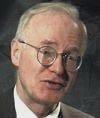IntroductionI have been asked to address
the question, Is the universe is designed?, from the perspective of process
theology, which is based on the philosophy of Alfred North Whitehead
(1861-1947). The name “process
theology” is derived from the title of Whitehead’s major work, Process and Reality, Whitehead had been an atheist or at least an agnostic during most of his adult life. But, shortly after beginning to develop his metaphysical cosmology, he came to the view that, if we are to give a fully rational account of the universe--meaning one that is both coherent and adequate to all the relevant facts, including the various dimensions of human experience--it is necessary to posit a nonlocal actuality. Although Whitehead used the term “God” for this actuality, the divine reality to which he referred, unlike the deity of traditional theism in the West, did not possess omnipotence as traditionally understood. Whitehead’s turn to a form of theism did nothing to lessen his antipathy to the idea of a divine being who, while having the power to prevent evil, refuses to do so. If faced with our question, Is the universe is designed?, Whitehead’s answer, like the answer to most Yes or No questions about complex issues, would have been Yes and No. This ambivalent answer reflects the fact that the notion of a designed universe has many connotations, not all of which imply all the others. I will deal with eight possible meanings of this notion, suggesting that, from the perspective of Whiteheadian process theology, the answer to six of them is No, but that there are two senses in which we can speak of the universe as designed.
Contributed by: David Ray Griffin |
|
Source: David Ray Griffin Related Media:
Other Resources:
|




